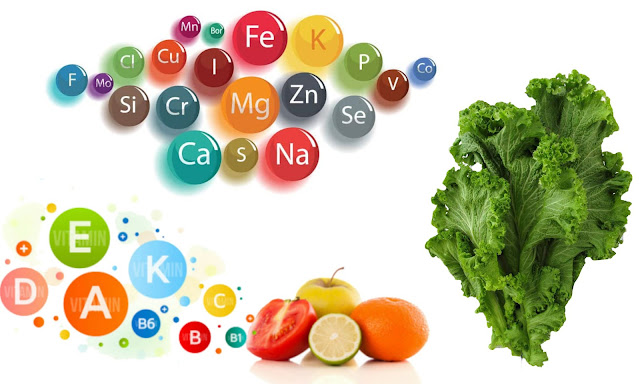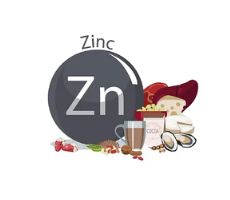 |
| Vitamin Mineral Greens |
Vitamins and Minerals boost our immune system, they play an important role in normal growth and development and help cells and organs to do their jobs.
Greens mean Leafy green vegetables that are good sources of vitamins and minerals and we can get these in nature. An essential part of a healthy diet is Leafy Greens. Greens are packed with high levels of fiber, iron, magnesium, potassium, calcium, vitamins, and minerals but low in calories.
And also green have minimal carbohydrates, sodium, and cholesterol. Eating greens regularly can have a significant amount of health benefits, including reduced risk of obesity, heart disease, mental decline, and high blood pressure.
In this post, first, we discuss vitamins, secondly discussed minerals, and finally, we have discussed greens. So, let's start with vitamins.
Vitamin
 |
| Vitamin |
Fat-soluble Vitamins and Water-Soluble Vitamins are two groups of vitamins. Vitamins A, D, E, and K are the four Fat-soluble vitamins that are stored in the body's liver, fatty tissue, and muscles. More easily these vitamins are absorbed by the body in the presence of dietary fat.
Vitamin C and all Vitamin B belong to the Water-Soluble Vitamins groups. There is a total of nine Water-soluble vitamins, and these vitamins do not store in the body. Excess amounts or any leftover of these leave the body through the urine. To prevent shortages or deficiencies in the body, you have to consume these all on a regular basis.
But vitamin B12 is exceptional and can be stored in the liver for many years. And there are some vitamins that like nutrients are also needed in the body such as Choline, Carnitine.
 |
| Vitamin A |
Vitamin A
To maintain healthy teeth, soft tissue, bones, mucous membranes, and skin, Vitamin A is very important. It also averts contaminations, is fundamental to keeping the eyes solid, and enables youngsters to grow appropriately.
Nourishment rich in vitamin-A incorporates orange and yellow foods grown from the ground including mangoes, carrots, sweet potatoes, and pumpkins; dull green vegetables, for example, spinach; liver and eggs.
Vitamins-B
 |
| Vitamins B |
Vitamin B1
It is known as Thiamine which helps the body cells change carbohydrates into energy. During pregnancy and breastfeeding, getting enough carbohydrates is very important. For heart function and healthy nerve cells, it is an essential part.
Vitamin B2
Also called Riboflavin is important for body growth and the production of red blood cells.
Vitamin B3 or Niacin
It helps maintain healthy skin and nerves that contain B vitamins and also has cholesterol-lowering effects at higher doses.
Vitamin B5
It is also known as Pantothenic acid, it is essential for the metabolism of food. In the production of Cholesterol and hormones, it plays a very important role.
Vitamin B6
is also known as pyridoxine. It helps to maintain brain function and to form red blood cells. Proteins that are a part of many chemical reactions, vitamin B6 play an important role in the proteins.
Like the other B Vitamins, vitamin B12 is also important to metabolism. It helps to maintain the central nervous system and to form red blood cells.
Vitamin C
 |
| Vitamin C |
Vitamin C encourages the body to retain press and to utilize supplements to assemble bones and veins. It is well-known as ascorbic acid, it is an antioxidant that promotes healthy teeth and gums.
It helps the body to maintain healthy tissue and absorb iron. For wound healing, It is also an essential part. The most organic product, particularly citrus foods grown from the ground vegetables including potatoes are great wellsprings of vitamin C.
Vitamin D
It is found in milk, eggs, and angel oils and it is additionally delivered by the body when the skin is presented to daylight. It is also well-known as the "Sunshine Vitamin". For most people at most latitudes, 10 to 15 minutes of sunshine 3 times a week is enough to produce the body's requirement of vitamin D.
 |
| Vitamin D |
That's why, for the maintenance of healthy teeth & bones and also for normal development you need calcium. This vitamin also helps to maintain proper blood levels of calcium and phosphorus.
Vitamin E
It is an antioxidant that is well-known as tocopherol and it helps the body form red blood cells and uses vitamin K.
Vitamin K
It is very important to the human body because Blood would not stick together without vitamin K. Some medical research says that it is important for bone health.
Biotin
It is essential for the metabolism of Carbohydrates and proteins, and in the production of Cholesterol and hormones.
Folate
It helps to form red blood cells for this it works with vitamin B12. It controls tissue growth and cell function, and the production of DNA, it plays an important role.
Low levels of folate are connected to the birth defects such as spina bifida, so pregnant women should be sure to get enough folate.
Choline
It helps in the nervous system and in the normal functioning of the brain. Swelling in the liver is a cause of a lack of choline.
Carnitine
In the human body, carnitine plays an important role to change fatty acids into energy.
Minerals
 |
| Minerals |
Let's know some brief about these minerals.
Calcium
Calcium is a major electrolyte mineral that is most often
associated with healthy bones and teeth. Although it also plays an important
role in helping muscles to contract, in blood clotting, and regulating normal
heart rhythms and nerve functions.
 |
| Calcium |
According to the Dietary Guidelines for Americans, calcium is one
of the nutrients of concern alongside magnesium and vitamins D and E.
In the human body Calcium is the most prevalent mineral, it plays
an important role in maintaining healthy bones and teeth. According to the
National Health and Nutrition Examination Survey, a large proportion of people
don't consume enough calcium.
In the survey, NHANES says that 40% of adults had an inadequate
intake of these nutrients.
This mineral also has functions that support muscle contraction,
blood clotting, nerve impulses, etc.
Medical research says that the best source of this mineral is
dairy foods. But some non-dairy food also is relatively high in this mineral.
Chloride
Another major mineral is Chloride. Also, it is an electrolyte that
plays a role in regulating fluids within the body.
Generally, from the dining table salt, most people consume an
adequate amount of chloride.
Chromium
In the human body, chromium work for digestive breakdown and
absorption of fat, carbohydrates, and protein. It is a trace mineral, so we
only require a small amount of this nutrient each day.
Cobalt: Like Chromium,
Cobalt is also a trace mineral and our body only requires minimal amounts each
day.
This is a component of vitamin B12, so getting enough vitamin B12
provides the requisite amounts of cobalt.
Copper
Though Copper is a trace mineral, this mineral is present in a
wide range of different foods.
In the human body, this mineral has several crucial functions and
it is a vital part of several important proteins and enzymes within the body
that ensure the optimal function of the nervous system and the cardiovascular
system, among others.
Iodine
 |
| Iodine |
Iodine is also a trace mineral and in producing thyroid hormones it plays a vital role.
That's why either excessive or insufficient iodine intake
adversely can impact thyroid health. According to health researchers, thought
that approximately two billion people are deficient in iodine globally.
Iron
There is an essential trace mineral that is Iron. It is available
in two different dietary forms. Such as:
- Heme iron (animal foods)
- Non-heme iron (plant foods)
A sufficient intake of iron plays a vital role to produce
hemoglobin, which is a compound that carries oxygen within the blood.
That's why the inadequate iron intake is a risk factor for
developing iron-deficiency anemia.
Magnesium
In the human body, Magnesium plays many crucial
roles, such as supporting muscle, energy production, and nerve function. Low
magnesium levels usually don't cause symptoms. However, chronically low levels
can increase the risk of heart disease, type 2 diabetes, osteoporosis, and high
blood pressure.
In the human body to support muscle and nerve function and energy
production Magnesium plays many crucial roles. Low levels of magnesium usually
don't cause symptoms. It is a major electrolyte mineral, so a chronically low
level can increase the risk of heart disease, high blood pressure,
osteoporosis, and type 2 diabetes.
A note, research shows that around half of the US population
consumes less than the recommended amount of magnesium.
Manganese
 |
| Manganese |
Manganese helps the body form bones, blood clotting factors, connective tissue, and sex hormones. It is an essential trace mineral that also plays a role in carbohydrate and fat metabolism, blood sugar regulation, and calcium absorption, but for the human body, it requires in relatively low amounts. Manganese is also necessary for nerve function and the normal brain.
It is also one of the most prevalent minerals in food, and a wide
range of animal-based foods and plant-based contain it.
Molybdenum
Molybdenum is one of the lesser-known but essential trace
minerals. In the human body, it plays a vital role for numerous enzymes, such
as sulfite oxidase and nitrogenase. This mineral is found in foods such as
cheese, cereal grains, milk, legumes, nuts, leafy vegetables, and organ meats.
It is most commonly used for molybdenum deficiency.
Phosphorus
According to medical science, Phosphorus is one of the major
minerals that makes up 1% of a person's total body weight and it is an
important component of bone and teeth. Even, about 85% of the human body's
phosphorus is in the teeth and bones. Though a small amount of phosphorous is
also present in cells and tissues throughout the body.
It plays an essential role in how the body stores and uses energy
and also helps to filter out waste in the kidneys. After a workout, it helps to
reduce the pain of muscle.
Potassium
Potassium is also one of the major essential minerals that are
needed by all tissues in the body. The primary role of Potassium is in regulating
the blood pressure in the human body. Sometimes it is referred to as an
electrolyte because it carries a small electrical charge that activates various
cell and nerve functions. Potassium is available in many foods naturally and as
a supplement.
Potassium plays a vital role in determining fluid balance inside
and outside of cells alongside sodium.
This mineral has many important functions, so the human body needs
the mineral in relatively high amounts.
Selenium
Selenium is an essential trace mineral and component of various
enzymes and proteins, called selenoproteins, that helps to make DNA and protect
against cell damage and function. These proteins also play a vital role, in the
reproduction and metabolism of thyroid hormones.
Sodium
 |
| Sodium |
As well as potassium sodium is also a major electrolyte mineral,
that helps to determine fluid balance within the body.
Though sodium is an important mineral, a high level of intake of
this mineral can lead to hypertension and increased blood pressure in some
individuals.
Zinc
 |
| Zinc |
Zinc is an essential trace mineral that, helps the immune system and metabolism function and supports the normal growth and repair of cells and tissues in the human body. It also plays an important role to wound healing and the sense of human smell and taste. We get enough zinc with a varied diet. Such chicken, red meat, and fortified breakfast cereals are good sources of zinc.
Greens: Now we will know a brief about Greens
 |
| Greens |
They contain folate, which protects against heart disease and
stroke, contain potassium, which lowers high blood pressure; and also contain
fiber, which keeps cholesterol in check.
Let's try to figure out how greens food is helping us.
Low in fat
As mentioned before that greens food are low in fat. Enriched with
vitamins, this green food help in cutting unnecessary fat.
Beneficial for digestion
Green foods are fiber-rich foods. Such as broccoli, leafy greens,
cabbage, beans, etc. That helps to good digestion and a healthy digestive
tract.
Regeneration of new cells
Green foods like peas, beans, and asparagus are contained huge
folic acid that helps the human body to produce and maintain new cells.
Eye and Cognitive health
Green foods are always good for the eyes. Because it contains
phytochemicals like zeaxanthin and lutein that are available in dark leafy
green vegetables. These help to reduce the risk factor of macular degeneration
and cataract that is the cause of blindness in the elderly. These also help to
reduce the risk of a certain type of cancer.
Leafy Greens contain
vitamin K which is associated with numerous health benefits including
maintaining healthy blood vessels, lessening the risk of heart problems, and
preventing bone loss with aging.
 |
| Leafy Greens |
Recent studies have also found vitamin K reduces the incidence of
age-related dementia and may promote eye health.
Allergies
The antioxidant compound help to reduce a wide range of allergens.
Japanese researchers found that EGCG is the abundant antioxidant compound in
green tea. So, they said that it may help stop your body from mounting an
immune response to a wide range of allergens, including pollen, pet dander, and
dust.
Some additions to greens powders like wheatgrass, green tea
extract, or other herbs can cause allergic reactions or side effects like
headaches and nausea.
Pregnancy or Breastfeeding Concerns
The nutritional supplements and added herbal in greens powders
could pose certain risks for pregnant or breastfeeding women, as the effects of
these supplements are not well known.
Anti-cancerous
Greens contain Quercetin which is a bioflavonoid. Antioxidants are
found in the flavonoid, which has unique anti-cancer properties.
Good immunity
Greens contain a high level of vitamins and minerals associated
with maintaining a healthy immune system. Greens contain a huge amount of
vitamin A, which enhances immunity because Vitamin A has anti-inflammatory
properties.
Diabetic-friendly
Greens contain a low level of Glycemic Index (GI) that is helpful
for those suffering from type 2 diabetes. Because GI is the measurement of
carbohydrate-rich foods and their impact on human blood sugar levels.
Great for bones and muscles
Greens play a vital role in bones and muscles because they are the
major source of iron and calcium. Medical science says that iron and calcium
help in getting stronger bones, blood clotting, and muscle contraction.
Watch The Video

Post a Comment